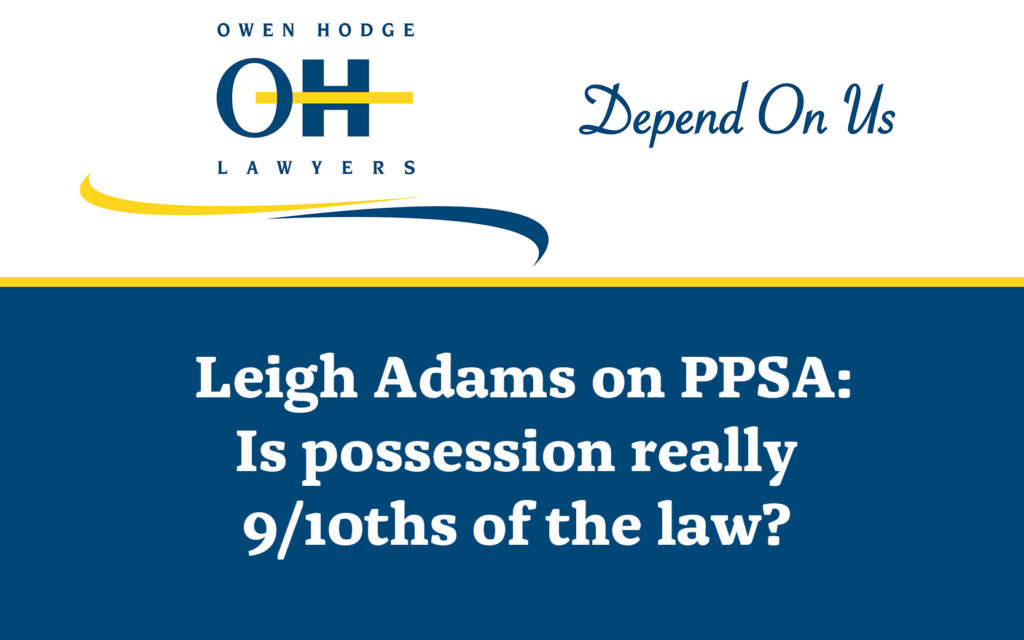
The Personal Property Securities Act 2009 (‘PPSA’) has been law for almost 6 years, but many businesses have still not experienced its impact in circumstances where their customer goes belly-up.
Many businesses mistakenly assume that registration on the Personal Property Securities Register (“PPSR”) is the only way to protect their interest in the goods that they have leased out or sold under retention of title arrangements to their customers. As many readers know, if registration does not take place or occurs too late, then the owner can lose all entitlements under the PPSA and end up as an unsecured creditor in the event that their customer falls into administration or liquidation.
However, registration is only one of several ways that the PPSA can protect (the PPSA calls this “perfect”) a security interest in goods. Other ways include the concepts of “temporary perfection”, “control” and “possession.”
What can an owner do if they discover that their customer is about to go into administration or liquidation, in circumstances where they have not registered their security interest in the goods in question, or the security interest was registered too late?
A recent case (Knauf Plasterboard Pty Ltd v Plasterboard West Pty Ltd (in Liquidation) (Receivers v Managers Appointed) [2017] FCA 866) considered this question.
In that case, the security interest was registered several years after it was granted (shortly after a breach of the supply agreement had occurred).
A game of cat and mouse then ensued: the supplier (Knauf) immediately appointed receivers to seize the goods. Retroflex prevented them gaining access to the premises where the goods were located for a day or so but the receivers in the meantime had written to the 4 major banks and got a reply from ANZ which agreed to freeze all of Retroflex’s accounts. Knauf then eventually got access to the premises and changed the locks.
Retroflex panicked and purported to have resolved to wind-up Retroflex two days later.
If Retroflex was wound up, then Knauf’s security interest (registered far too late) would vest in Retroflex and Knauf would have to apply to the Court for an extension of time to register the security interest – a time consuming, costly and risky exercise.
If Knauf was unsuccessful in extending time for registration of its security interest, then the assets available to unsecured creditors would be expanded by the value of Knauf’s goods, thereby reducing the chances that Retroflex’s director might be sued for breaches of director duties.
But in trying to outfox the supplier’s receivers, Retroflex forgot to give all of its members notice of the proposed meeting at which the wind-up resolution was to be passed. The Court said that the wind-up resolution was therefore void. So the security interest did not vest in Retroflex and Knauf did not have to apply to extend time for registration after all.
The Court then considered what would have happened if the wind-up resolution was valid. As Knauf had not applied to extend time for registration, the Court said that in such circumstances the security interest would have vested in Retroflex.
But Knauf argued that even if the wind-up resolution was valid, its security interest was “perfected by possession” prior to the wind-up resolution occurring. It argued that because “perfection by possession” was as good as “perfection by registration”, the result would have been no different.
Knauf had 3 main arguments.
The first was that the mere act of appointment of the receivers constituted “actual possession” or “apparent possession” as required by the PPSA. The Court dismissed this argument as artificial.
The second was that after appointment, the receivers had an intention to control the goods and a right to possession of the goods. But this is “constructive possession” which is specifically excluded by the PPSA.
The third was that by changing the locks to the premises where the goods were located, the receivers had “actual or apparent possession” as required by the PPSA.
The Court agreed with this argument but said that the possession was obtained by seizure or repossession which was an exception to the “perfection by possession” rule.
So what can owners do? The best practical thing to do is register in time. If you are out of time, the Court has power to extend time for registration. But the cases show this is risky and does not always work.
The good news is that in many cases, the Court has extended time for registration, although such orders are often conditional on any subsequent administrator or liquidator having the right to challenge the order if they are appointed within the next six months. In one case, the Court granted the extension of time even after an administrator had been appointed.
The bad news is that once you become aware of the problem of not being registered, you have to register as soon as possible. In one case, a delay of one month after becoming aware of the need to register was held to be too long.
Leigh Adams
Special Counsel
Owen Hodge Lawyers

